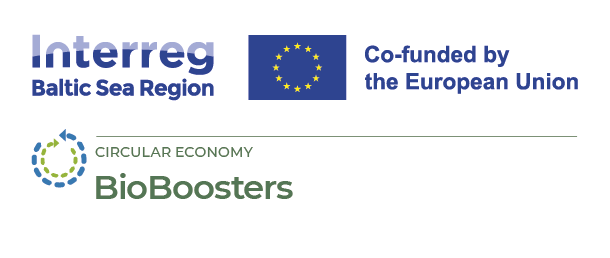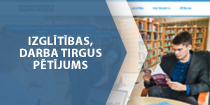|
|
Boosting the circular transition (BSR BioBoosters)
Biobased businesses have a growing pressure for circular bioeconomy business models to keep up with the green transition, meet the demands of their customers and to find new business opportunities. However, the transition is slowing down due to lack of human resources and knowledge capacity in the rural regions of the Baltic Sea. More transnational co-operation and innovation services are needed for scaling up regional circular (and digital) bioeconomy solutions.
BioBoosters is responding to this by developing a demand-driven business hackathon model (BioBoost hackathon model) to lower down structural barriers for cross-sectoral and transnational innovation work and modernizing the bio-based industry. The model is tailored to the needs of well-established bio businesses for adopting circular business models and key enabling technologies acquired in the transition provided by cross-sectoral innovators (SMEs, start-ups etc.) attracted from the whole BSR. The regional bioeconomy hubs (BioBoost hubs) have a key role supporting the circular transition by preparing and testing the BioBoost hackathon model, conceptualise and make it accessible and attractive for businesses. Eventually model is ready to be adopted by any existing innovation hubs. BioBoosters continues previous project initiatives by promoting bioeconomy but focusing more systemized model development reflecting the regional challenges (S3) hindering the BSR circular transition.
| Title |
Boosting the circular transition
|
| Abbreviation |
BSR BioBoosters |
| Lead partner |
JAMK University of Applied Sciences (Jamk), Institute of Bioeconomy, (Central-Finland) |
| Programme |
Interreg Baltic Sea Region programme 2021 -2027 |
| Partners |
1. JAMK University of Applied Sciences (Jamk), Institute of Bioeconomy, Central-Finland
2. The Paper Province economic association (PP), Sweden, Karlstad
3. Biofuel Region BFR AB (BFR), Sweden, Västerbotten
4. Vidzeme Planning Region (VPR), Latvia, Vidzeme
5. Estonian university of life sciences (EMU), Estonia, Tartu
6. Witeno, Germany, Mecklenburg-Vorpommern
7. Pärnu County Development Centre (Pärnu), Estonia
8. The Foundation for Education and Social Dialogue (PRO CIVIS), Poland, Świętokrzyskie
9. Sunrise Valley Science and Technology Park (SVSTP), Lithuania, Vilnius
|
|
Associated Organisations
(Latvia)
|
1. Furniture Producers Association in Latvia
2. Latvian Wood Construction Cluster |
| Objectives |
To solve challenges that well established bio businesses face in transitioning to circular bioeconomy.
|
| Activities |
1. To prepare and test the Business Hackathon model. Bioeconomy companies and support organizations will be selected in the regions, which, in accordance with local smart specialization strategies, raise regional challenges that require new circular bioeconomy solutions. Developers of potential solutions will be attracted from the entire Baltic Sea region, thus providing access to new knowledge and market opportunities.
2. To conceptualize the model of Business Hackathon according to the challenges of each region.
3. To make the Business Hackathon model available and interesting to companies. Bring to life its' viability mechanism even after the project ends.
|
| Results |
1. A total of 18 hackathons were organized in the regions (2 in each region), to find international solutions to local bioeconomy challenges.
2. An evaluation analysis of the Business Hackathon model as a facilitating tool in the transition to the circular economy carried out.
3. Prepared implementation plan for long-term use of the developed model.
|
| Budget |
Total budget: 2,788,365.42 EUR
Vidzeme planning region budget: 207,992.00 EUR, of what Programme cofinancing: 166,393.60 EUR and Vidzeme planning region contribution: 41,598.40 EUR
|
| Implementation period |
01.2023.-31.12.2025
|
| Contact person |
Rita Merca
+371 29476373
rita.merca@vidzeme.lv
|
| Project website |
https://interreg-baltic.eu/project/bioboosters/ |
LP1 JAMK University of Applied Sciences (Jamk), Institute of Bioeconomy, Central-Finland
PP2 The Paper Province economic association (PP), Sweden, Karlstad
PP3 Biofuel Region BFR AB (BFR), Sweden, Västerbotten
PP4 Vidzeme Planning Region (VPR), Latvia, Vidzeme
PP5 Estonian university of life sciences (EMU), Estonia, Tartu
PP6 Witeno, Germany, Mecklenburg-Vorpommern
PP7 Pärnu County Development Centre (Pärnu), Estonia
PP8 The Foundation for Education and Social Dialogue (PRO CIVIS), Poland, Świętokrzyskie
PP9 Sunrise Valley Science and Technology Park (SVSTP), Lithuania, Vilnius
|
|





